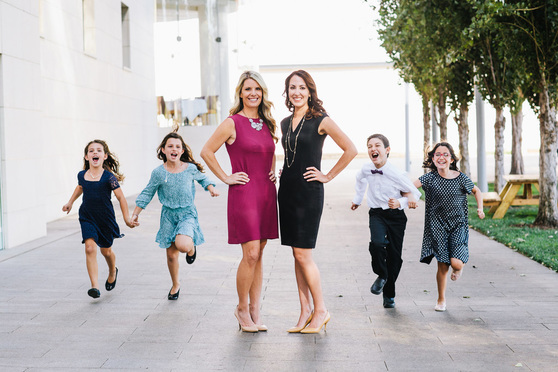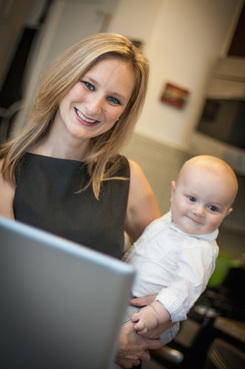'Extreme Part-Time' Lawyer-Moms Flock to Freelance Firms
So-called "accordion law firms" have become particularly popular with lawyer moms who want to dramatically reduce their hours after they give birth, but who also want to stay in the legal game.
August 29, 2018 at 01:30 PM
7 minute read
 Laurie Rowen and Erin Giglia with their children. (Photo: Alexa Miller)
Laurie Rowen and Erin Giglia with their children. (Photo: Alexa Miller)
After having her second child, Southern California litigator Erin Giglia worked part-time for law firm Snell & Wilmer, but fellow associate Laurie Rowen had different plans for work when her baby girl was born 16 days after Giglia's daughter.
Rowen always knew she wanted to be a stay-at-home mom, while continuing to do legal work on an extremely part-time basis. It took nearly a year for Giglia to jump on board, but when she did, the pair co-founded Montage Legal Group, a new legal business model especially attractive to women.
Montage and firms like it have proven a good match for all sorts of lawyers who want to set their own work terms, but they have become particularly popular with lawyer moms who want to dramatically reduce their hours after they give birth, but who also want to stay in the legal game. The part-time experience at these kinds of firms also eases the transition back into the profession full time, if they choose to, when their children get older.
About 85 percent of Montage's 300 freelance attorneys are lawyer moms who average 10 hours of work weekly, Giglia said. “It's a very sought-after way to go about keeping a hand in the legal field while not having the punishing schedule.”
It was Joan Williams, law professor and director of the Center for WorkLife Law at the University of California, Hastings College of Law in San Francisco, who picked up on the trend of freelance law firms and reported her findings in a 2015 report, “Disruptive Innovation: New Models of Legal Practice.” Many of these firms call themselves freelance attorney networks, but Williams penned another name that stuck, “law firm accordion companies,” because they allow a law firm or in-house legal department to staff up for a surge of work, and staff back down right after.
“It used to be that people who didn't want to work full time in the law—they just dropped out for like 20 years,” Williams said. “They tried to get back in and some failed, some succeeded.”
That phenomenon, no doubt, is a contributing factor to the low numbers of women partners in private practice. Women make up 45 percent of the associate ranks in private practice, but only 19 percent of equity partners, the American Bar Association's Commission on Women in the Profession reported in January. Only 26 percent of general counsel at Fortune 500 businesses are female.
Williams noted in her report that Big Law offers part-time attorney schedules—but with strings attached. Part-time lawyers face the stigma of being viewed as less committed to the law firm and their work assignments decline in quality. Part-time lawyers might also face “schedule creep,” where the hours ramp back up slowly toward full-time, but not their pay. Therefore, Big Law attorneys leave their firms rather than asking for flextime, she wrote.
One of the first freelance law firms was Counsel On Call, based in Nashville, launched in 2000, followed by Montage in 2009. Three other early companies, since acquired by larger businesses, are Custom Counsel, Cadence Counsel and Intermix Legal Group. Other newer freelance attorney networks operating today are Flex Counsel in Texas, Overflow Legal Network in Nevada, Flex Legal Network in Canada, Hire an Esquire and Axiom Law.
Today, so many attorneys want to join freelance networks that acceptance is highly selective and the businesses attract talent from top law schools, with Big Law experience or equivalent prestige in other legal employment sectors, according to Williams' report.
Jane Allen, founder and board member of Counsel On Call in Nashville, the longest-running freelance attorney group, said she launched the company in 2000 to stop highly talented women attorneys from leaving the law. She estimates that half of Counsel On Call's 1,000 freelancers are lawyer-moms.
 Chelsea Beser and her son Jake.
Chelsea Beser and her son Jake.(Photo: Kelley Bruso)
Chelsea Beser, a New Jersey-based freelance litigator who has worked with Montage for six years, left her associate job at Boundas, Skarzynski, Walsh & Black to go freelance when her first child was born because she wanted control of her schedule. She now has three kids, two boys, 6 and 4 years old, and a 1-year-old girl. Once a week Beser also teaches legal writing at Fordham University School of Law in New York. With the two gigs, she works between 10 to 20 hours a week, and spends the rest of her time involved in her kids' school.
“It allows me time to do that: volunteer in the community, and just be home for them,” Beser said.
At the same time, she didn't want to be a true stay-at-home mom. She wanted to continue to reap the benefits of law school and, as it turns out, she enjoys practicing law.
“It allowed me to keep a piece of myself, aside from just the children,” she explained. “I can use my brain aside from just the child care.”
While old-school contract attorney staffers may have focused on mundane tasks like document review, today's freelance attorney networks say they can fulfill a need for high-level legal work. Lawyers might draft motions or briefs, assist with discovery or handle appeals. Freelance corporate attorneys might do anything from creating a basic agreement to assisting with a merger to setting up an equity raise.
Beser said she's actually performed a greater variety of legal work as a freelancer than she did as a full-time attorney. Her main client through Montage is a solo practitioner who handles a variety of matters from criminal law to commercial disputes. Beser has worked on appeals, drafted any type of pleading, conducted research and responded to newspaper articles.
“Every assignment is different, which is nice,” she said.
As her children grow, freelancing with Montage will allow Beser to continue ramping up her hours. And if she decides to practice law full-time again, she'll have a better chance of landing that job.
“I still don't know how easy it will be to get back to something full time, but I think it will be easier than if I had stopped completely,” Beser said.
Williams, the law professor, said that with a resume that shows 20 years performing high-end legal work, albeit part-time, it's much easier to go back to a full-blown legal career after shipping the kids off to college.
With 19 years in the business, Allen, at Counsel on Call, said she's seen plenty of her freelance attorneys return to full-time work without a problem, bolstered by the fact they've kept their skills fresh.
“We definitely have been in it long enough to see people become clients, because they decided to go back and then they are in a position to hire people,” she said.
Angela Morris is a freelance journalist. Follow her on Twitter at @AMorrisReports.
This content has been archived. It is available through our partners, LexisNexis® and Bloomberg Law.
To view this content, please continue to their sites.
Not a Lexis Subscriber?
Subscribe Now
Not a Bloomberg Law Subscriber?
Subscribe Now
NOT FOR REPRINT
© 2025 ALM Global, LLC, All Rights Reserved. Request academic re-use from www.copyright.com. All other uses, submit a request to [email protected]. For more information visit Asset & Logo Licensing.
You Might Like
View All
The Right Amount?: Federal Judge Weighs $1.8M Attorney Fee Request with Strip Club's $15K Award

Kline & Specter and Bosworth Resolve Post-Settlement Fighting Ahead of Courtroom Showdown
6 minute read
12-Partner Team 'Surprises' Atlanta Firm’s Leaders With Exit to Launch New Reed Smith Office
4 minute read
Morgan Lewis Shutters Shenzhen Office Less Than Two Years After Launch
Trending Stories
Who Got The Work
J. Brugh Lower of Gibbons has entered an appearance for industrial equipment supplier Devco Corporation in a pending trademark infringement lawsuit. The suit, accusing the defendant of selling knock-off Graco products, was filed Dec. 18 in New Jersey District Court by Rivkin Radler on behalf of Graco Inc. and Graco Minnesota. The case, assigned to U.S. District Judge Zahid N. Quraishi, is 3:24-cv-11294, Graco Inc. et al v. Devco Corporation.
Who Got The Work
Rebecca Maller-Stein and Kent A. Yalowitz of Arnold & Porter Kaye Scholer have entered their appearances for Hanaco Venture Capital and its executives, Lior Prosor and David Frankel, in a pending securities lawsuit. The action, filed on Dec. 24 in New York Southern District Court by Zell, Aron & Co. on behalf of Goldeneye Advisors, accuses the defendants of negligently and fraudulently managing the plaintiff's $1 million investment. The case, assigned to U.S. District Judge Vernon S. Broderick, is 1:24-cv-09918, Goldeneye Advisors, LLC v. Hanaco Venture Capital, Ltd. et al.
Who Got The Work
Attorneys from A&O Shearman has stepped in as defense counsel for Toronto-Dominion Bank and other defendants in a pending securities class action. The suit, filed Dec. 11 in New York Southern District Court by Bleichmar Fonti & Auld, accuses the defendants of concealing the bank's 'pervasive' deficiencies in regards to its compliance with the Bank Secrecy Act and the quality of its anti-money laundering controls. The case, assigned to U.S. District Judge Arun Subramanian, is 1:24-cv-09445, Gonzalez v. The Toronto-Dominion Bank et al.
Who Got The Work
Crown Castle International, a Pennsylvania company providing shared communications infrastructure, has turned to Luke D. Wolf of Gordon Rees Scully Mansukhani to fend off a pending breach-of-contract lawsuit. The court action, filed Nov. 25 in Michigan Eastern District Court by Hooper Hathaway PC on behalf of The Town Residences LLC, accuses Crown Castle of failing to transfer approximately $30,000 in utility payments from T-Mobile in breach of a roof-top lease and assignment agreement. The case, assigned to U.S. District Judge Susan K. Declercq, is 2:24-cv-13131, The Town Residences LLC v. T-Mobile US, Inc. et al.
Who Got The Work
Wilfred P. Coronato and Daniel M. Schwartz of McCarter & English have stepped in as defense counsel to Electrolux Home Products Inc. in a pending product liability lawsuit. The court action, filed Nov. 26 in New York Eastern District Court by Poulos Lopiccolo PC and Nagel Rice LLP on behalf of David Stern, alleges that the defendant's refrigerators’ drawers and shelving repeatedly break and fall apart within months after purchase. The case, assigned to U.S. District Judge Joan M. Azrack, is 2:24-cv-08204, Stern v. Electrolux Home Products, Inc.
Featured Firms
Law Offices of Gary Martin Hays & Associates, P.C.
(470) 294-1674
Law Offices of Mark E. Salomone
(857) 444-6468
Smith & Hassler
(713) 739-1250








